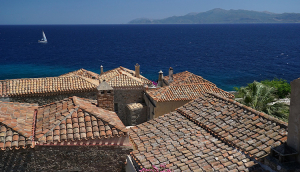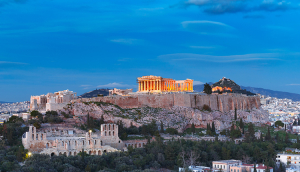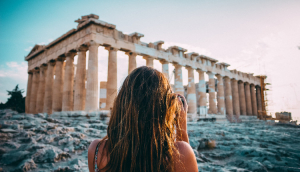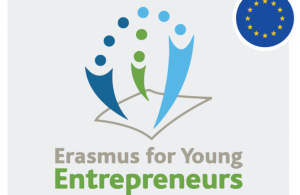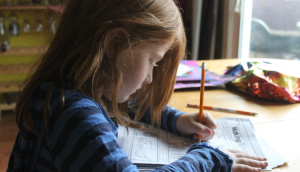LIFE & CULTURE
XpatAthens
5 Greek Masterpieces Found In Museums Abroad
1. Venus De Milo, Louvre Museum, Paris, France
5. Caryatid, British Museum, London, United Kingdom
This content has been sourced and prepared by Codico Lab
Greece Aims To Open-Up For Tourists By July 1
All going well, Greece will probably be able to start welcoming tourists by July 1.
To read this article in full, please visit: cnn.com
Welcoming The Digital Citizens' Academy
Originally posted in Greek on nationaldigitalacademy.gov.gr
Athens Music Week Goes Phygital
Amazing Greece In 2 Minutes
How to Feel Like You’re In Athens In 5 Easy Steps
Affected by lengthy lockdowns, most of us would rather be somewhere else right now! However, until traveling for pleasure becomes a possibility again, thisisathens.org has made a list of activities that will infuse your home with Athenian character.
2. Whip Up A Freddo
- Put a medium-sized empty metal container such as a bar shaker in the freezer, preferably metal.
- Run 2 short espresso doses into a cup, add sugar as desired, and set aside.
- Pour milk into the cold metal container till it's half full. Add a couple of ice cubes if the milk or the container isn't cold enough.
- Use a small handheld mixer to beat the milk and if you don't have a mixer, use a makeshift shaker and shake till your arm hurts and set aside.
3. Cook A Greek Dish
4. Soak Up Athens Street Art
Get acquainted with the most passionate mavericks putting their mark on the city with thisisathens.org's Athens Street Art slideshow. And if you are more of a classicist, take a tour of Robert McCabe's beautiful vintage photography collection of Athens in the fifties, set against some pretty mighty ancient monuments.
5. Watch A Greek Cinema Classic
If you want to travel away to happier times mentally, embark on a celluloid journey with Greek national superstar Melina Mercouri across a swinging sixties Athens in Never on Sunday. In this all-time classic feel-good movie, a free-spirited prostitute named Ilya meets an American tourist named Homer. This award-winning movie placed both the port of Piraeus and Melina Mercouri on the world map, and it's also said to have inspired the then First Lady Jackie Kennedy to travel to Athens–as it will you!
For even more ways to feel like you're in Greece, please visit: thisisathens.org
Beyond Coronavirus: Greece To Start Lifting Lockdown Measures
Mitsotakis stressed the importance of keeping sanitary rules and social distancing; he also revealed a new motto, "We Stay Safe," as the sequel of the "We Stay Home" campaign we've seen across the media since the beginning of the outbreak.
In his scheduled speech, the Prime Minister praised Greeks for adhering to the rules and restrictions, adding that Greece "is now ready to proceed to the second phase" of the plan. Below is a timeline of the progressive lifting of safety measures in Greece that will unfold in phases, beginning on Monday May 4 and until mid-June.
Monday, May 4
More specifically, small retail shops such as bookstores, sporting goods stores, and hair salons will open on May 4, while the SMS procedure for leaving our house will also be dropped on the same day. People will be allowed to travel freely within their prefecture of residence, but not outside. For example, those living in Athens can travel freely within the Attica region only. Churches will also re-open for individual prayer, abiding, however, to the strict rules regarding how many worshippers will be allowed in the church at the same time. Church services are still banned.
Monday, May 11
On May 11, senior high schoolers will be able to return to school, and all retail stores will re-open for business.
Sunday, May 17
On May 17, churches will be allowed to resume religious services and sacraments, still having to adhere to firm social distancing safety measures.
Monday, May 18
Further relaxation of the measures will come on May 18, when the rest of the high schoolers will be returning to school. On the same day, archaeological sites will re-open for visitors.
Monday, June 1
Malls, cafes, and restaurants with outdoor seating areas will be back to business on June 1, following social distancing rules. Finally, year-round hotels will open again, adopring all the required public health measures.
Depending on the developments, the rest of the economic activity will resume by mid-June. The Prime Minister also mentioned said that the gradual lifting of the measures is going be to be accessed by a panel of experts every 24 hours.
When To Use A Mask
As the Prime Minister stressed, it is crucial to remember and follow safety measures.
The use of a mask is mandatory by customers and workers in hair and beauty salons and in every service that requires physical contact.
Workers in supermarkets and food shops will also be required to wear a mask. It is strongly recommended that commuters and workers in the public transport system also wear masks.
Due to their susceptibility to the virus, elders are also advised to use a mask.
CLICK HERE to learn more about how to protect yourself, symptoms, and when to seek medical treament.
This content has been sourced and prepared by Codico Lab
Erasmus For Young Entrepreneurs - Online Info Day
On Wednesday May 27 at 15:00 you are invited to attend the Info Day of Erasmus for Young Entrepreneurs program, which will be available in Greek, in order to learn more about the program and get information on how you can participate. During the event, you will be able to get acquainted with the Academy of Entrepreneurship and the current educational and research projects in which it is involved, which aim at enhancing the entrepreneurship competences of youths and socially vulnerable groups, as well as to expand your professional network.
About The Program
Εrasmus for Young Entrepreneurs is a promising program aiming at equipping aspiring, new or social entrepreneurs with expertise, knowledge, and skills in order to develop their business model. It offers the opportunity for participants to communicate, exchange, and share business ideas with experienced peers, and learn to live, work, and collaborate with people in the environment of a foreign country. The program also addresses existing companies in Greece which are provided with the opportunity to collaborate with foreign entrepreneurs, gain important knowledge that can substantially contribute to the development of their activities, and expand their established business.
To register please click here
How Greece Has Become A Shining Example During The Coronavirus Outbreak
From once being the black sheep of Europe, Greece is now a shining example of crisis management and efficient administration!
To read this article in full, please visit: The Guardian
Homeschooling During Lockdown: Adapting To New Conditions
![]()
If there’s a topic you’re interested in and would like to learn more about you may contact me via email. For more information about me and my work check the XpatAthens Directory or visit my website. Because this is your life!



